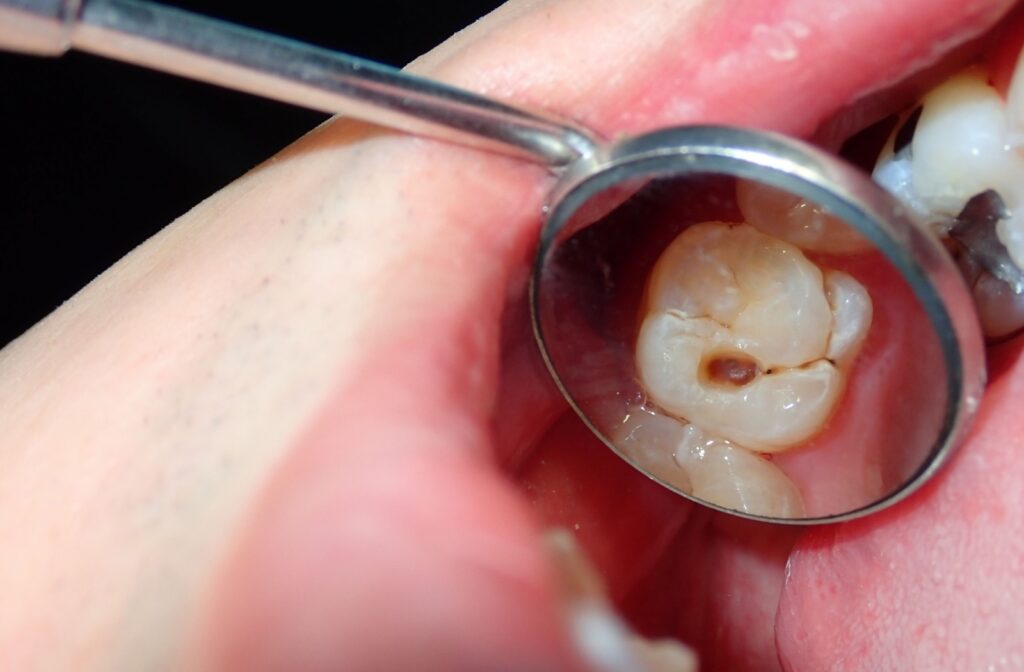You might feel a little zing when sipping something cold, or notice a faint spot on your tooth in the mirror. These small signs are easy to dismiss, especially if the discomfort comes and goes. Many people delay making an appointment, thinking they’ll wait and see if it improves. It’s a natural reaction—but worth paying attention to.
So, how long can you leave a cavity untreated? The short answer is: not long. Cavities don’t heal themselves, and even a small one will continue to grow. For some people, decay can progress in just a few months. Waiting often means the difference between a quick filling and a more involved treatment like a crown or root canal. Addressing a cavity early is the safest way to protect your tooth, avoid pain, and keep treatment simple.
What Is a Cavity & How Does It Progress?
Understanding what happens inside your mouth can help your family protect their smiles. Tooth decay starts when plaque—a sticky film of bacteria—builds up on your teeth. When you consume sugary foods or drinks, these bacteria produce acids that can eat away at your tooth’s hard outer layer.
Early Signs of Tooth Decay You Can Spot
Sometimes, a cavity develops without any obvious signs. When symptoms do appear, you might notice one of the following:
- White spots on a tooth’s surface
- Sensitivity to sweet, hot, or cold foods and drinks
- Mild discomfort when you bite down
- A visible hole or dark pit in your tooth
The Four Stages of Progression
A cavity develops over time, moving through four general stages. First, the decay is only in the enamel, the tooth’s outer layer. As it progresses, it reaches the softer dentin layer underneath, which can increase sensitivity.
If left untreated, the decay can enter the pulp at the centre of the tooth, where the nerves and blood vessels are located. This stage is often painful. Finally, the infection can spread to the root tip, forming a painful abscess that may cause swelling.
Timelines & Risks of a Cavity
The rate at which a cavity grows is different for everyone. Factors like your diet, oral hygiene habits, and even where the cavity is in your mouth can affect its speed. This is why regular dental exams are so helpful for monitoring your oral health.
How Fast a Cavity Can Grow
A cavity can sometimes progress quite quickly, especially with a diet high in sugars and acids. For some people, a small spot of decay can become more serious in just a matter of months. Paying attention to any changes in your teeth is a good habit.
The Problem with a Long Wait
Waiting a year or more to fill a cavity allows a small problem to become a much larger one. What might have been a simple filling could turn into a situation requiring a crown, root canal, or even an extraction. Early treatment is often simpler and helps preserve your natural tooth structure.
When Tooth Pain Is a Sign for Action
Pain is your body’s way of waving a red flag—especially when it comes to your teeth. A persistent ache or sharp pain can be a sign of a dental emergency and a clear reason to connect with a dental professional. Don’t ignore what your mouth is trying to tell you.
What Tooth Pain Means
Pain often means that the decay has reached the more sensitive, inner layers of your tooth. It’s not too late for treatment, but it does mean the cavity has become more advanced. The sooner you get it looked at, the sooner you can find relief and a solution.

Treatment Options for Cavities & Advanced Decay
Fortunately, there are several ways to address tooth decay and restore your tooth’s health and function. Your dental team can talk with you about the right path for your specific situation. The goal is always to get your smile back to feeling comfortable and healthy.
Fillings & Crowns
For cavities that haven’t reached the tooth’s pulp, fillings are a common solution. A filling removes the decayed portion of the tooth and fills the space to restore its shape. For larger cavities, a dental crown may be used to cover and protect the entire tooth.
Root Canals & Extractions
If decay reaches the tooth’s pulp, a root canal may be recommended to clean out the infection and save the tooth. In cases where the tooth is too damaged to be saved, an extraction may be necessary. No matter which option is right for you, your comfort is always our priority.
Restoration with Dental Implants
If a tooth needs to be removed, there are options to replace it and complete your smile. A conversation with your dentist about dental implants can help you understand this durable and natural-looking solution. They function just like a real tooth, helping you eat and speak with ease.
Protect Your Family’s Teeth & Prevent Future Cavities
The best news? Cavities are largely preventable. Developing good oral health habits is the foundation for a lifetime of healthy smiles. Prevention is always a team effort between you and your dental professionals.
The Role of Regular Teeth Cleaning
Professional cleanings are a key part of preventing cavities. A hygienist can remove hardened plaque, called tartar, that you can’t get rid of with a toothbrush at home. A regular teeth cleaning helps keep your teeth and gums healthy.
At-Home Oral Health Habits
Your daily routine is your first line of defence against tooth decay. Brushing twice a day with fluoride toothpaste and flossing once a day helps remove plaque before it can cause problems. It’s a simple habit that makes a big difference.
Protect Your Smile with Genesis Dental
Cavities can sneak up quickly, but with regular check-ups and good daily habits, they don’t have to turn into a bigger problem. From prevention and cleanings to comfortable, effective treatment options, our team is here to help protect your smile at every stage.
At Genesis Dental, we know dental visits can feel stressful for some patients, which is why we’ve created a calm and welcoming space where you and your family can feel at ease. Whether you’re concerned about a possible cavity or simply want to stay on top of your oral health, we’re here to support you with compassionate care and modern solutions.Contact us today to schedule your appointment and take the next step toward a healthy, confident smile.




